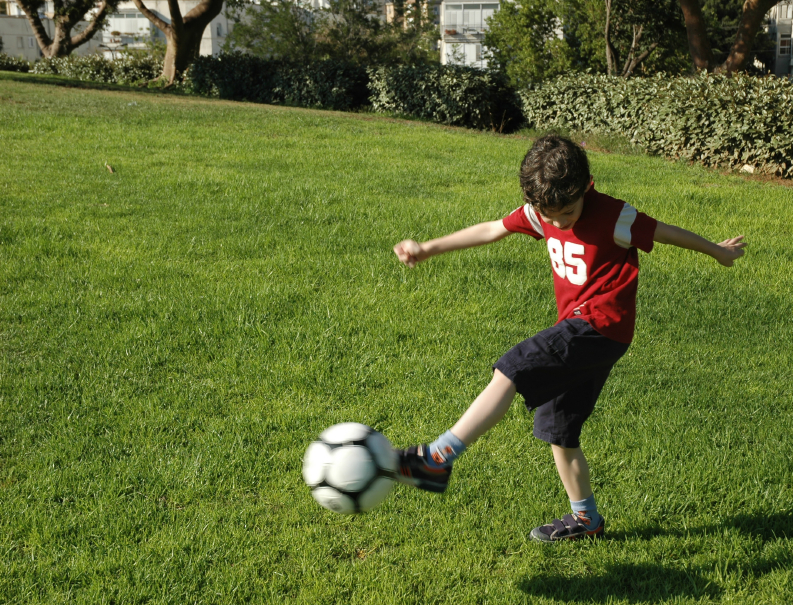 An article ran in the Wall Street Journal yesterday called Why I Don’t Want My Kid To Play Team Sports.
An article ran in the Wall Street Journal yesterday called Why I Don’t Want My Kid To Play Team Sports.
The author, a sports writer named Jeff Pearlman, explained that he was turned off to team sports in 1982, when his shy, un-athletic brother was benched for three-quarters of every soccer game, and only played the minimum number of minutes the coach was required to play each kid. It did a number on his brother’s confidence, he explained, and because of that, he doesn’t want his kids playing team sports, just individual ones.
I read the article with interest, because, as you know if you’ve read this column with any regularity, my son, too, has struggled with team sports. He’s played soccer, baseball, flag football and basketball, and he’s not particularly good at any of them. In basketball, when the coaches have to make one kid sit twice because of the substitution rules, my son is the kid. In baseball, he bats eighth. In football, he does the snap. In soccer, he plays goalie a lot.
He’s dropped out of football and basketball, but he still plays soccer and baseball, a) because he needs to get exercise somewhere, b) because I’ve always believed that important lessons about teamwork and having people depend on you are learned from being on a team, and, most importantly, c) because he likes being part of a team and bonding with his friends.
But Pearlman argues otherwise. He writes, “I want my kids to run track and cross country – where the ultimate goal is to accomplish your personal best. I want them to learn an instrument, to master a craft, to join the drama club. I want my son to be a ‘science nerd.’ I want my daughter to write poetry. I don’t care if they win and I don’t care if they lose, as long as they try and as long as they’re happy. We place such an unhealthy emphasis in this country upon victory, without stopping to ponder the end game. Yes, medals are nice. Trophies, too. But, really, what’s so important about being the best? Why are we so focused on the result, while forgetting the value of the journey?”
And that’s where I lost him. I know that there are lots of coaches out there who care about winning over all else. I’ve seen them, and I get it. But I also know that there are lots of coaches out there, like my husband, who coach because they want kids to learn a skill, and to enjoy playing for the sake of playing. Or like my son’s soccer coach, who praises him after every game just for trying hard, even if he barely touched the ball. Or the basketball coach he once had, who forbid anyone else on the team from shooting until my son made a basket.
These are good guys, who are in it for the right reasons. Not all coaches are using the 1982 playbook.
At the same time, though, I do see his point. He talks about how his son was asked to play “fall ball” in baseball, in order to ‘focus more on the game.’ When his son said no, he knew that that would “begin his inevitable decline. The ‘Fall Ball’ kids will be far superior. The coaches will hand them the prime positions. My son will be placed in right field. He’ll hit eighth. Maybe ninth. He’ll grow frustrated, feel inferior, lose interest. It won’t be as bad as 1982, but it’ll seem familiar.”
He’s not wrong. My son didn’t want to play fall ball, either, and it’s gone just as Pearlman predicted. Same thing with the kids who play club soccer. But what Pearlman doesn’t seem to realize is that if you hang in there long enough, by the time they’re nine or ten, those kids are long gone from community sports. In AYSO, the U-10 and U-12 teams aren’t that competitive, because all of the really good kids have left to play club full time. In baseball, the kids who play year-round have abandoned little league for All-Star teams and traveling leagues. So what you’re left with – at least in my experience – are teams filled with average players who are finally given a chance to shine.
In P.E. at my son’s school, every fall is spent doing a unit on football. My son hates it, because nobody ever passes to him. The other kids stopped giving him a chance years ago, when they all decided that, because he didn’t play outside of school, he wasn’t good enough to bother with. But my son throws the ball around in the back yard with my husband all the time, and while he’s not an amazing football player by any means, the kid’s not half bad.
A few weeks ago, by chance, he happened to intercept a pass and score a touchdown, juking a few kids along the way. The other boys were shocked – they’d had no idea he was capable of such a move – and he instantly earned credibility. Since then, he gets a pass almost every game, and I swear, I’ve never seen him happier, more self-confident, and more excited to go to school than he’s been these last few weeks.
Pearlman is right – team sports can crush a kid’s confidence, and being the best shouldn’t be the ultimate goal for a sports team. But team sports can also make a kid’s confidence soar, too, even when that kid has already been crushed a million times before. It’s amazing to have the feeling of saving the day, of scoring the winning goal, of knowing that your friends think you’re able to get the job done. This is why we play team sports, and I wouldn’t take that away from my kid for anything.





